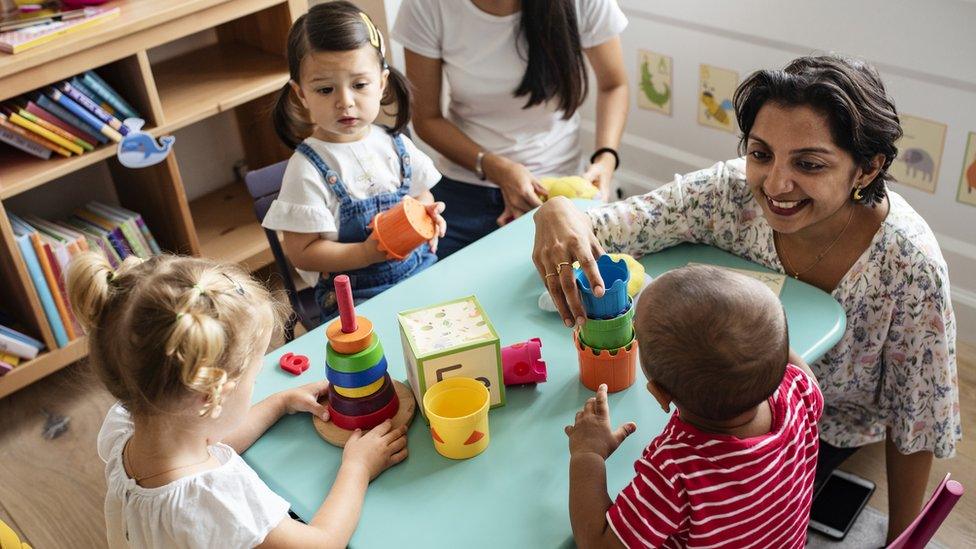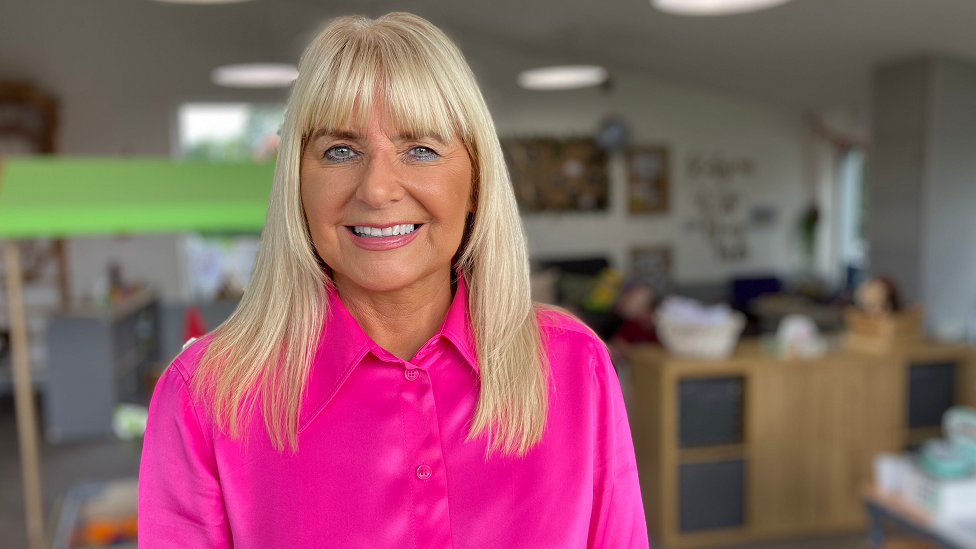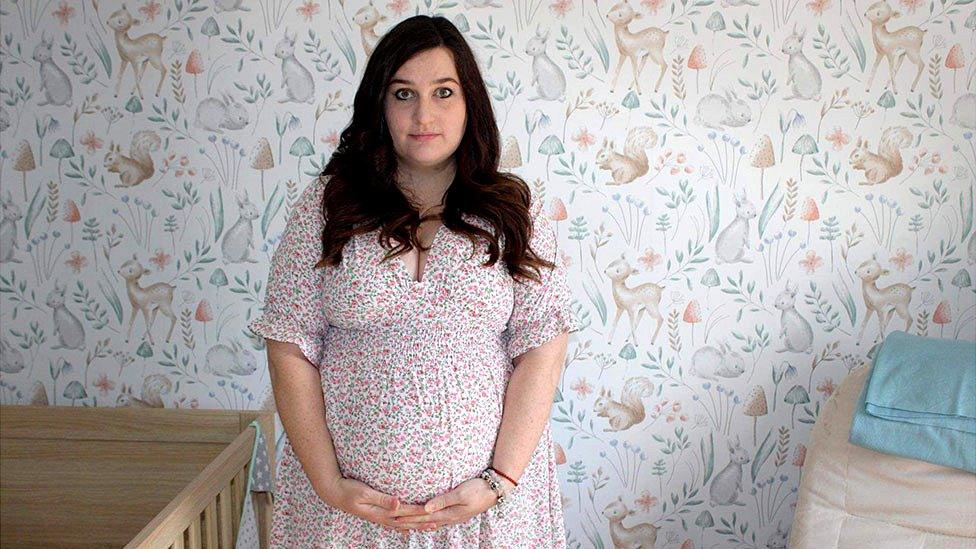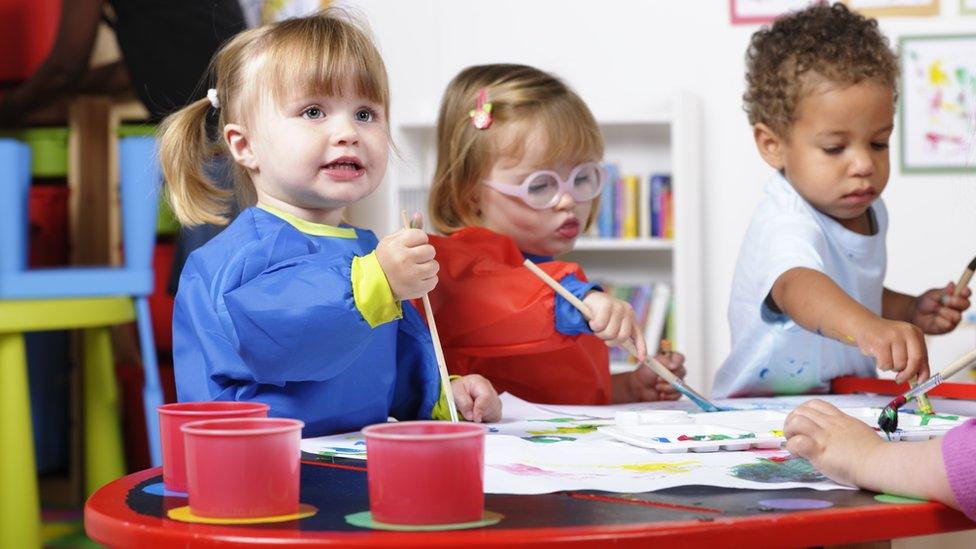Childcare providers welcome £400m funding but say more support needed
- Published

The government has announced an increase in the hourly rates for funded childcare places from April 2024
The government is to invest £400m in its plans to expand free childcare for working parents in England from April.
The Department for Education (DfE) has also announced an increase in funding rates for nursery places.
The average hourly rates available to providers will be £11.22 for under-twos, £8.28 for two-year-olds, and £5.88 for three and four-year-olds.
Providers called it a "welcome increase", but said demand for places could soon outstrip capacity.
The expansion was announced in the Budget earlier this year, when Chancellor Jeremy Hunt said the current scheme offering some families 30 free hours of childcare per week would be extended to cover younger children.
It was intended to help 60,000 more parents of young children back into the workforce.
Eligible working parents of three and four-year-olds already receive 30 hours a week of government-funded childcare.
From April, working parents of two-year-olds will be able to access 15 hours of funded childcare.
And from September, this offer will be extended to children aged nine months and above, increasing to 30 hours from September 2025.
Eligibility depends on each parent or carer earning more than the equivalent of 16 hours at the National Living Wage per week.
And the government said its increases from April 2024 reflected increases in the National Living Wage.
In September, hourly funding rates increased from an average of:
£5.29, for three- and four-year-olds, to £5.62
£6.00, for two-year-olds, to £7.95
Education Secretary Gillian Keegan said the government was "making sure parents no longer have to choose between a career and a family".
But childcare providers in England have long raised concerns over funding not matching demand for places.
Over the summer, an Education Select Committee report found underfunding had left the sector "straining to provide" enough places for children.
Robin Walker, who chairs the committee, said the childcare market faced significant challenges in "affordability and availability". And new funding rates would have to "accurately reflect the costs of providing high-quality early education and childcare" if the government was to successfully extend the number of free hours available to parents.
Children's Minister David Johnston told BBC Radio 4's Today programme the government was in regular direct contact with local authorities and providers, to understand the cost pressures they were facing.
"We survey 10,000 providers nationally, to try and get the rates that we pay for childcare at the right level," he said, adding he was "optimistic" the government could deliver each stage of the upcoming expansion in provision.

Nicola Fleury runs a group of five nurseries in Salford
Nicola Fleury, who owns the Kidzrus Nursery Group, in Salford, Greater Manchester, said four of her five nurseries were already close to capacity.
"We're going to have to look around at where we can accommodate these places. I just hope that for some settings it isn't too little, too late," she said.
"It is a very welcome increase but I just hope it makes a real impact."
Early Years Alliance chief executive Neil Leitch also said the funding increase was "welcome" but "still likely to fall short of what the sector needs to successfully deliver the 30-hours expansion in the long term".
"With the start of the expansion just months away, it remains to be seen whether there is any hope of this policy actually working in practice," he added.
Disadvantaged children
Institute for Fiscal Studies (IFS) associate director Christine Farquharson told BBC News the sector was facing a real-terms cut even with the extra funding.
"If you were to account for all of the cost pressures childcare providers face - the rising minimum wage, the increase in mortgages, all those things - resources per hour for three- and four-year-olds will be 10% lower in real terms next year than they were back in 2012," she said.
The National Day Nurseries Association (NDNA) said the announcement showed the government was "not serious about paying a fair rate for high-quality early education and care" and called for more clarity around how the early-years funding system worked.
NDNA chief executive Purnima Tanuku highlighted the 2p per hour rise in the Early Years Pupil Premium (EYPP) - extra funding given to childcare providers to support disadvantaged children.
"These children have the most to gain from access to early education and care places - but this will not allow providers to make the kind of impact they want," she said.
"This is a missed opportunity to fix to some of the major challenges in the early years ahead of the planned expansion of funded childcare."

Are you pregnant and on a nursery waiting list? Are you unable to extend your childcare hours? Are you travelling long distances for suitable childcare? Share your experiences by emailing haveyoursay@bbc.co.uk, external.
Please include a contact number if you are willing to speak to a BBC journalist. You can also get in touch in the following ways:
WhatsApp: +44 7756 165803
Tweet: @BBC_HaveYourSay, external
Please read our terms & conditions and privacy policy
If you are reading this page and can't see the form you will need to visit the mobile version of the BBC website to submit your question or comment or you can email us at HaveYourSay@bbc.co.uk, external. Please include your name, age and location with any submission.

Sign up for our morning newsletter and get BBC News in your inbox.

Related topics
- Published17 November 2023

- Published26 July 2023

- Published15 March 2023
